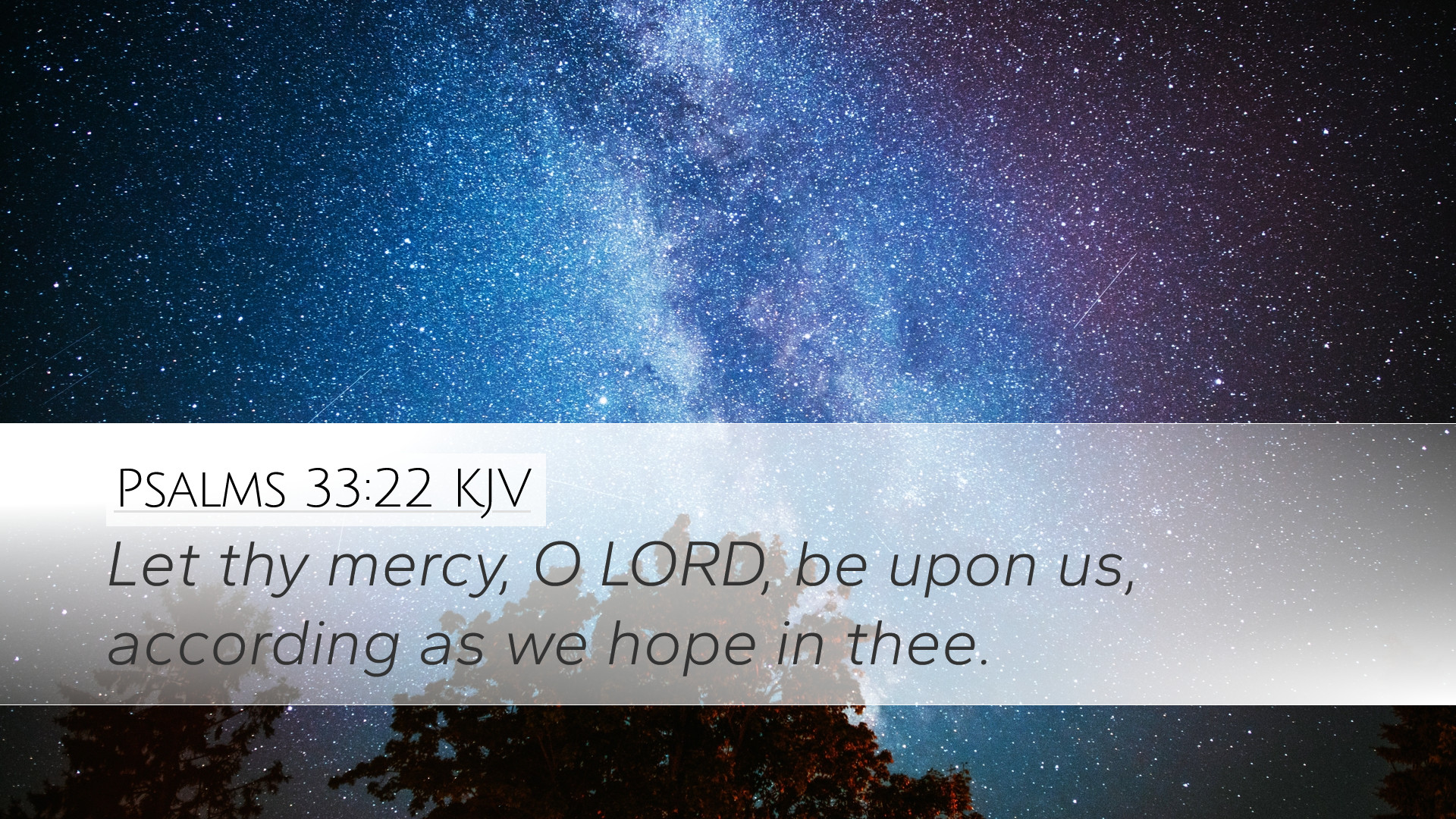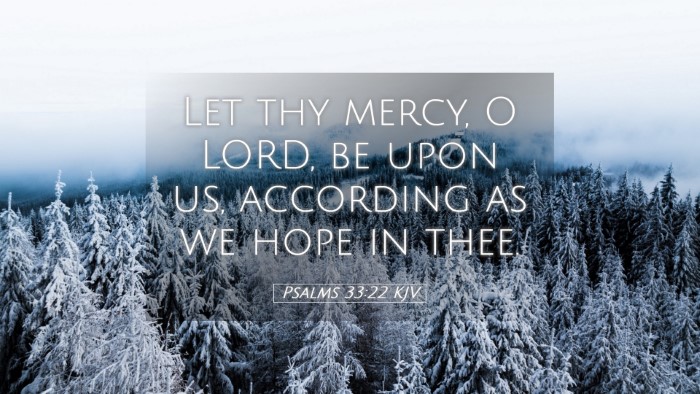Psalms 33:22 Commentary
Verse: "Let thy mercy, O Lord, be upon us, according as we hope in thee." (Psalms 33:22)
Introduction
This verse encapsulates a profound plea to the Lord, emphasizing the relationship between divine mercy and human hope. It is a reflection of the psalmist's earnest desire for God's steadfast love to be evident in the lives of His people, contingent upon their trust and expectation in Him. This commentary seeks to explore this verse through insights from renowned public domain theologians, enriching our understanding of its significance in the broader context of the Scriptures.
Divine Mercy
Matthew Henry highlights the magnitude of God's mercy, describing it as essential for the sustenance of the faithful. He explains that divine mercy is not merely a passive quality but an active force that seeks to guide, protect, and provide for those who trust in God. The psalmist's plea acknowledges the reality of human weakness and sinfulness, thereby appealing to God's unwavering compassion.
Albert Barnes adds that mercy is a central theme of God's character. He notes that true mercy is accompanied by grace and forgiveness, underscoring that God's readiness to pardon sinful humanity is foundational to any relationship between God and His creation. Barnes elaborates on how this request for mercy is both personal and communal, affecting the collective experience of Israel as God's chosen people.
The Role of Hope
The second part of the verse states, "according as we hope in thee," which introduces the concept of hope as a key element of faith. Adam Clarke emphasizes that hope is the anchor for the soul (Hebrews 6:19), providing stability amidst life's uncertainties. He observes that the degree of our hope should mirror the magnitude of our request for mercy; as our hope in God deepens, so too does our expectation for His mercy.
Matthew Henry reflects on the notion that hope in God is not passive but active. Those who truly hope in the Lord will demonstrate their trust through their actions, worship, and obedience. This dynamic relationship showcases the proactive nature of faith, wherein believers are encouraged to cling to their hope even amidst challenges.
The Interconnection of Mercy and Hope
This verse illustrates a fundamental theological principle: our experience of God's mercy is intimately connected to our expectation and faith in Him. Albert Barnes emphasizes that hope leads to actions that demonstrate our reliance on God's character. He suggests that this plea serves as a reminder that those who place their hope in the Lord can expect to experience His mercies in abundance.
Adam Clarke further enriches this discussion by stating that hope can strengthen the believer through trials. When the faithful call upon God's mercy with anticipation, they create a fertile ground for spiritual growth and resilience. This connection also suggests that a dwindling hope can negatively impact one's awareness of God's mercy.
The Broader Context of Psalms 33
Psalms 33 is a song of praise, emphasizing God's sovereignty, creative power, and faithfulness to humanity. The context surrounding verse 22 showcases the psalmist's celebration of God's mighty acts and His just governance over the earth. Strongly reflected throughout the text is the idea that the people of God have a right to call upon Him in faith, expecting His intervention and mercy.
Matthew Henry points out that the verses preceding 33:22 emphasize God's power in creation and His oversight in human affairs. This acknowledgment of God's authority serves as the foundation for the request for mercy. When believers recognize God's greatness, it naturally leads to a greater reliance on Him and a hopeful outlook on His responses to their pleas.
Albert Barnes indicates that the overall theme of dependence on God in Psalms 33 invites believers to trust in divine providence as they look to the future. The expression of hope must flow from a recognition of God's past deeds and character, thus creating a coherent understanding of trust.
Application for Believers
This verse carries significant implications for contemporary believers. The act of reaching out to God for mercy while placing hope in His goodness is a powerful reminder of the relational aspect of faith. Adam Clarke urges believers to maintain their hope in times of uncertainty, reminding them that God's mercy is not dependent on human merit but rather on His nature and promises.
Moreover, Matthew Henry encourages believers to cultivate a consistent prayer life, calling upon God's mercy regularly. This petition should be framed by a hopeful expectation, recognizing God's readiness to respond to the sincere cries of His people.
Albert Barnes reminds us that hope in the Lord ultimately leads to transformation. When believers align their actions with their trust in God, it can manifest in a life marked by gratitude, godliness, and service to others, reflecting the mercies they have received.
Conclusion
Psalms 33:22 serves as a potent reminder of the intertwining of God's mercy and our hope in Him. Through the insights of noted theologians, we see a rich tapestry of meaning woven into this simple yet profound verse. For pastors, students, and scholars alike, the call to seek God's mercy while remaining steadfast in hope is both a challenge and an encouragement—a recognition of God's unchanging nature amidst our fluctuating circumstances.


